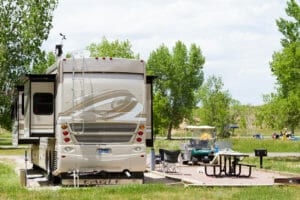If you’re an RV owner and are wondering if it’s necessary to winterize your RV, the answer is fairly straightforward. If the RV is being stored in an area where the temperature may potentially dip below freezing at any time, winterization is needed. The only exception to this rule is for RVs that have no water on board, which are very few. That means no faucets, no shower, no flushing toilet, no fresh, grey or black water tanks, etc.
Even those no-water RVs require some winterization, such as taking the propane tanks and batteries inside during the winter months and charging the batteries monthly. Failure to do this may cause problems, but nothing as significant as having your entire plumbing system freeze up and require repair or replacement. RVs with onboard water absolutely need proper winterizing in order to prevent significant damage that could require costly repair before the next RV season.
RV Winterization Tips, Whether Still on the Road or Being Stored ‘Til Spring
You may choose to continue using your RV during the cold weather or set it aside during winter to be safely stored until next spring. Either way, your rig will require a certain amount of winterizing. Here are some must-have RV winterization tips.
-
- The most important item on your winterizing list, whether you’ll be storing your RV or plan to still use it, is to purge the plumbing system and then fill it with RV antifreeze. Use only non-toxic RV antifreeze (which is pink), as opposed to regular automobile antifreeze. Click here for easy to understand step-by-step instructions for winterizing your RV’s plumbing system. As an alternative to the antifreeze route, some experts advise merely emptying all plumbing lines and appliances and then blowing out the system by hooking up an air compressor.
- Before storing your RV for the winter, clean out all food and beverages from the kitchen and take the opportunity to deep clean your kitchen so it’s ready and waiting for next RV season.
- Remove all bedding, linens and towels and empty all cupboards and drawers.
- If storing your RV outdoors, apply a full cover to prevent leaks. Also cover the tires after jacking up the RV and placing boards between the tires and the ground surface.
- Empty and defrost the refrigerator and freezer.
- If using public storage for your RV, remove propane tanks, batteries, and all portable appliances to prevent theft.

